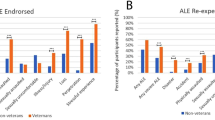Abstract
A patient with posttraumatic stress disorder (PTSD) had a major depressive episode that was responsive to treatment with the antidepressant fluoxetine. In contrast to the remission of other symptoms of depression, the associated feature of survivor guilt became more dramatically obvious. Individualized treatment of survivor guilt may be needed for patients with PTSD and major depression.
Similar content being viewed by others
References
American Psychiatric Association (1994). Diagnostic and statistical manual of mental disorders (4th ed.). Washington, D.C: Author.
Beck, A. T. (1978). Depression Inventory. Philadelphia, PA: Philadelphia Center for Cognitive Therapy.
Emery, P. E., & Emery, O. B. (1985). The defense process in posttraumatic stress disorder. American Journal of Psychotherapy, 4, 541–552.
Farid, B., Elsherbini, M., & Raistrick, D. (1986). Cognitive group therapy for wives of alcoholics—A pilot study. Drug and Alcohol Dependence, 17, 349–358.
Gartner, J., Larson, D., & Allen, G. (1991). Religious commitment and mental health: A review of the empirical literature. Journal of Psychology and Theology, 19, 6–25.
Giglio, J. (1993). The impact of patients' and therapists' religious values on psychotherapy. Hospital and Community Psychiatry, 44, 768–771.
Green, B. L., Grace, M. C., & Gleser, G. C. (1985). Identifying survivors at risk: Long-term impairment following the Beverly Hills Supper Club fire. Journal of Consulting and Clinical Psychology, 53, 672–678.
Hamilton, M. (1960). A rating scale for depression. Journal of Neurology, Neurosurgery and Psychiatry, 23, 56–62.
Keane, T. M., & Fairbank, J. A. (1983). Survey analysis of combat related stress disorders in Vietnam veterans. American Journal of Psychiatry, 140, 348–350.
Kofoed, L., Friedman, M. J., & Peck, R. (1993). Alcoholism and drug abuse in patients with PTSD. Psychiatric Quarterly, 64, 151–171.
Mellman, T. A., Randolph, C. A., Brawman-Mintzer, O., Flores, L. P., & Milanes, F. J. (1992). Phenomenology and course of psychiatric disorders associated with combat-related posttraumatic stress disorder. American Journal of Psychiatry, 149, 1568–1574.
New International Version (1988). The Holy Bible. Tyndale House Publisher Inc., Wheaton, IL.
Peteet, J. R. (1994). Approaching spiritual problems in psychotherapy. Journal of Psychotherapy Practice and Research, 3, 237–245.
Smith, D. E. (1994). AA recovery and spirituality: An addiction medicine perspective. Journal of Substance Abuse Treatment, 11, 111–112.
Southwick, S. M., Yehuda, R., & Giller, E. L. (1991). Characterization of depression in combat veterans with posttraumatic stress disorder. American Journal of Psychiatry, 148, 179–182.
Spero, M. H. (1985). The reality and the image of God in psychotherapy. American Journal of Psychotherapy, 39, 75–85.
Yager, T., Laufer, R., & Gallops, M. (1984). Some problems associated with war experience in men of the Vietnam generation. Archives of General Psychiatry, 41, 327–333.
Yehuda, R., Southwick, S. M., & Giller, E. L. (1992). Exposure to atrocities and chronic posttraumatic stress disorder in war veterans. American Journal of Psychiatry, 149, 333–336.
Yehuda, R., Kahana, B., Southwick, S. T., & Giller, E. L. (1994). Depressive features in Holocaust survivors with posttraumatic stress disorder. Journal of Traumatic Stress, 7, 699–704.
Author information
Authors and Affiliations
About this article
Cite this article
Khouzam, H.R., Kissmeyer, P. Antidepressant Treatment, Posttraumatic Stress Disorder, Survivor Guilt, and Spiritual Awakening. J Trauma Stress 10, 691–696 (1997). https://doi.org/10.1023/A:1024862223220
Issue Date:
DOI: https://doi.org/10.1023/A:1024862223220




